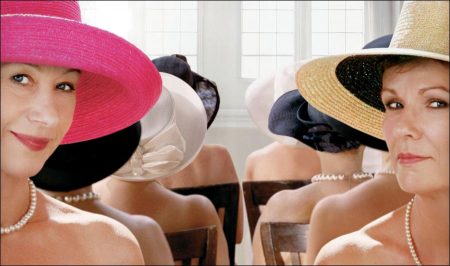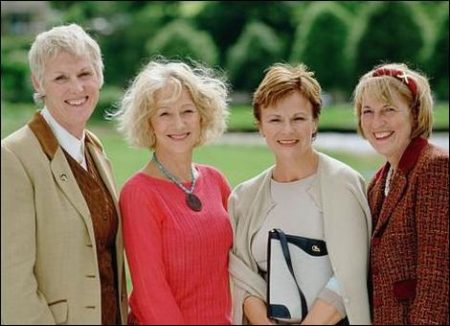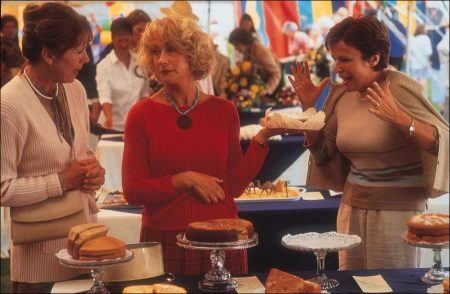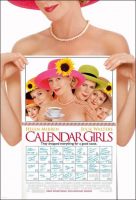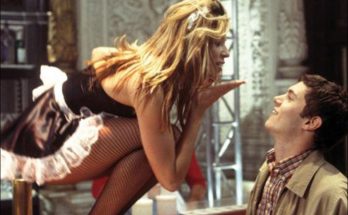Taglines: They dropped everything for a good cause.
Chris and Annie are the best of friends – very different, but very close. Living in a small village in the Yorkshire Dales, their peaceful lives are shattered when Annie’s husband dies of leukemia. An active member of the local Women’s Institute, Chris enlists the support of her fellow members in a fund-raising initiative for the local hospital. Her seemingly traditional idea is to produce a calendar, with a different woman photographed for each month. Each one will be engaged in a classic WI task, such as jam making, flower pressing and knitting.
Sounds traditional enough, but her idea has a radical twist – the women will be in the nude. Before they know it, the women are hitting the headlines at home and abroad. Whisked off to Hollywood on a whirlwind publicity tour, they take their turn on the talk shows and in magazine photo shoots. Amidst the hype and glamour, the friendship between Chris and Annie is put to the test.
About the Production
The story for Touchstone Pictures’ new film “Calendar Girls” was inspired by the reallife story of the Rylstone and District Women’s Institute, an organization that strives to “seek happiness in achievement. In April 1999, when the group published their 2000 calendar, they knew they might raise a few eyebrows, but they didn’t expect much drama. The calendar was published in the hope of raising a few pounds for the local hospital, which had cared for Angela Baker’s husband John who had recently died of leukemia.
Angela, her friend Tricia Stewart and fellow members of the WI wanted to give something back to the place and the people who’d treated John at the end of his life. To boost sales, Tricia suggested that the calendar have a more original theme. It would feature the women engaged in traditional Women’s Institute activities, such as cider-pressing, cake baking and flower arranging, but the novel element was that the models, all of a certain age, would be in the nude.
The story hit the headlines immediately. The calendar was published and spread through Yorkshire, down to London and even across the Atlantic to Hollywood. The calendar was a huge story in all the British media, across Europe, and in the USA, where stories ran on the front page of the New York Times and on CBS’ 60 Minutes, the Today Show, and 20/20, and in People Magazine among others. Everyone everywhere wanted to know more about the courageous – and outrageous – women of the Rylstone and District Women’s Institute. The calendar was such a success that by early 2003 it had sold nearly 300,000 calendars, raising nearly £600,000 for leukemia charities. It also turned the women into national – and international – celebrities.
“We had no idea that we would get so much coverage when we launched the calendar,” says Angela Baker, whose husband John’s death inspired the calendar. “We just thought it would only appeal to our friends and family.”
The women could not have been more wrong about the impact of the calendar; and before long Hollywood came knocking at the door. Their story, combining heart-rending drama and gutsy determination, was a natural for the big screen. And yet it surprised the women when the offers started flooding in. Given the subject matter, the women of Rylstone were understandably cautious.
“The idea of a film was quite nerveracking,” explains Baker. “I thought it would be very hard on me and my family to watch our story unfold on the big screen; it was so very personal and I wasn’t sure I wanted anyone to Touchstone Pictures’ share it. I was worried it might be too intrusive coming so soon after John’s death.”
When producers Suzanne Mackie and Nick Barton and screenwriter Juliette Towhidi visited the women of Rylstone WI, it soon became clear that they had the women’s interests at heart. “Angela and Tricia really put us through our paces on the first meeting,” says Mackie. “We told them we were struck by it being a very funny story, but more importantly a very moving human drama and that the substance of story came from Angela’s husband’s death from leukemia. That’s what gave it depth and meaning and took it from being a jokey, frivolous story to a poignant and universal story.
“What also appealed to me was the fact that it was a woman’s story,” Mackie continues. “My initial reaction was, good on you, girls for having the guts to shout from the rooftops: `Just because we’re over 40 it doesn’t mean we can’t look beautiful!’ There’s a very strong sense of female camaraderie in the story, which I found enormously appealing. These women really support each other in every way.”
Once Angela Baker and Tricia Stewart were on board (“When I met Suzanne and Nick, we just clicked,” recalls Baker) the producers then began negotiations with the members of the group to secure rights to the individual women’s stories. Alert to how sensitive the issue was, they made several visits to Yorkshire to get to know the group and to assure them of their intentions.
It was in December 2000 that director Nigel Cole joined the project. ”We had a list of several directors, but we knew that Nigel would bring the right sensibilities to the film,” Mackie says. “He would allow the comedy to come out of the drama and create a characterled and emotionally layered film: a human story both funny and poignant.”
“It’s pure coincidence that both films I’ve directed are about women,” Cole says, “but I do like working with women. I won’t ever be a man’s director because I’m not much of a bloke. There are other directors who would do a better job of doing violence. I like to mix comedy and drama and “Cold Feet,” “Saving Grace,” and “Calendar Girls” all have that in common. I like making people laugh and cry. I’m a bit of a softie at heart and get a bit sentimental, but I get embarrassed about that so I like to puncture it with a joke. Romantic comedy is a genre where you can do both.
“The fact that this film is inspired by a true story brings its own challenges and pressures,” Cole continues. “It’s always important not to have a patronizing attitude towards your characters, because the audience can sniff that out a mile off. Because it’s a real story, we all wanted to remain true to the spirit of that story but we also wanted to make a good film, so we knew we had to take some liberties.”
Unfamiliar with the world of the Women’s Institute, Cole says he was unsurprised by what he found when he visited the ladies of Rylstone. “They turned out to be exactly as I had expected,” he says. “They were funny and bright and not at all conservative and dull. These women are in their mid-late 50s, so they were teenagers in the 60s. In the real story, there was very little opposition to what they did, but drama is about conflict, so we had to create some paper tigers – like with the board members at the WI conference in London whose approval they need to go ahead who, at first appear horrified by the idea but then come round. The characters of Chris and Annie were inspired by Tricia and Angela and they were always the naughty ones giggling at the back of the class, so I wanted to reflect that. One thing that did surprise me, however, was just how competitive that world is: the WI women really take the festivals seriously and they really care about winning the prizes.”
Cole was keen to ensure the film wasn’t just a knockabout comedy. “Perhaps in a different time, the film would have charted the struggle to get the calendar done and would have left the women on a high. I wanted to take it further because when I met the real women it was clear that – although they were all very happy that they’d done this very important thing – it wasn’t without its tears and I felt that was an interesting part of the story. I wanted to show that they flew quite close to the sun and burnt their wings. I’m glad that in the third act we addressed the idea of celebrity as a monster that gets out of control.”
Meanwhile, the filmmakers brought on board Tim Firth, the writer of such acclaimed television dramas as “Preston Front” and “Neville’s Island,” to rework Towhidi’s screenplay. “Juliet had created a beautiful and lyrical world for the film,” Mackie says, “as well as a cast of characters that were fully-rounded and completely authentic, but everyone felt that the screenplay needed some additional comic input and a northern voice, which we knew that Tim could provide.”
“I was very hesitant at first,” Firth admits. “I’d never worked on any pre-existing material before, and was unsure whether I could or wanted to do it. I had, however, bought the calendar the year it came out and as it turned out had met one of the Calendar Girls in the process without realizing it. My mum was in the WI and so was my Gran. Also, the girls came from the village where I’d spent every summer holiday of my childhood. And I had paintings in my house from the gallery of the guy who took the calendar photos, so everything just seemed to be pointing me in the direction of this film.”
One of his biggest challenges was negotiating the fine-line between the humor in the story and the raw, tragic drama of John’s death. “This is not a documentary,” Firth insists. “My attitude towards the true story was to know it happened and then forget about it. I didn’t meet the actual women until after I’d finished. For me it was very important to detach the film from its source and not get personally involved with the real characters in ways that might, frankly, impede me being critical if necessary. I identified the core of the story being about the achievement of celebrity through the most tragic of ends. This darker gene of the story and the comedy, which punctures any mawkishness, is an in-built antidote to sentimentality, which I’m not interested in. Fighting sentimentality in times of crisis is what I find genuinely moving.”
Director Cole concurs: “It would have been easy to focus on that side of the story – on a man dying of leukemia. I was keen to see the aftermath of that, so I worked very hard with Tim Firth on trying to make what could have been a chocolate box of sentiment into a film that had some edge. I encouraged everyone to think of it as a big film. That influenced everything, from the script, to the cast to the design.”
Calendar Girls (2003)
Directed by: Nigel Cole
Starring: Helen Mirren, Julie Walters, John Alderton, Linda Bassett, Annette Crosbie, Philip Glenister, Ciaran Hinds, Celia Imrie, Geraldine James, Penelope Wilton
Screenplay by: Juliette Towhidi
Production Design by: Martin Childs
Cinematography by: Ashley Rowe
Film Editing by: Michael Parker
Costume Design by; Frances Tempest
Art Direction by: Mark Raggett
Music by: Patrick Doyle
MPAA Rating: PG-13 for nudity, language, drug-related material.
Distributed by: Touchstone Pictures
Release Date: December 19, 2003
Visits: 40
